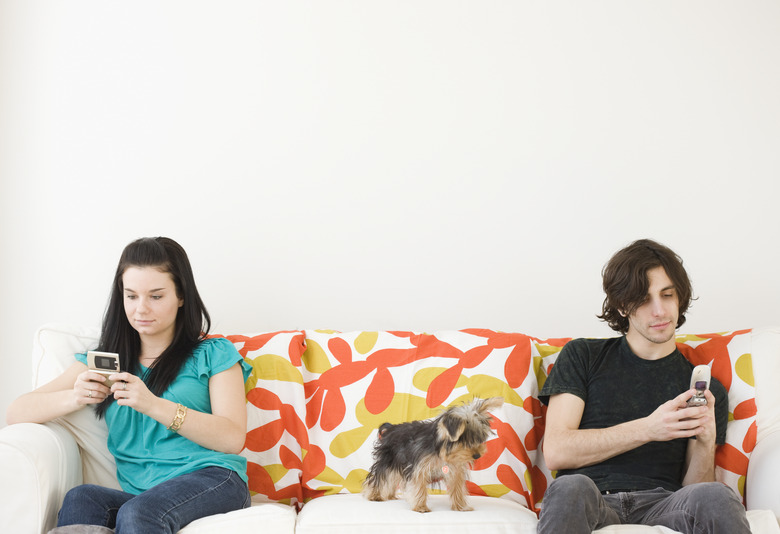How To Train Your Dog To Stop Barking At The Door
When it comes to training your dog, sometimes it's easier to train a "yes" than a "no." What do we mean by that? Well, simply that teaching a dog to do something new can be easier than trying to train a dog to suppress a natural instinct. Case in point: barking at the door.
If your dog is naturally inclined to bark like crazy to alert you when there's an intruder...or a mailman, or a friend or a phantom noise that could be coming from the general door vicinity and you'd like them to, you know, not do that, then keep reading. Here's your guide to getting your dog to stop barking at the door (or anything else he barks at, for that matter).
Why do dogs bark at the door?
Why do dogs bark at the door?
First, let's start with a universal truth: Dogs bark. Every dog. It's natural and it's not something that you can ever train out completely. But, if your dog is barking excessively, whether at knocks at the door or something else, that becomes an issue.
So, why do dogs bark? Well, there are lots of reasons, actually. Here are a few of the most common:
- Territorial or protective barking: Dogs are animals and animals tend to be territorial. When they feel like something or someone is encroaching on their territory, they often react by barking. If this is what's driving your pup's excessive barking, he'll be very alert and maybe even a little aggressive. Basically, this is the "GTFO of my space" bark.
- Alarm or fearful barking: If your dog isn't just barking when they're at home, then chances are, they aren't defending their territory so much as expressing fear. This is your dog's way of saying, "Hey human, look at that scary thing and take care of me, please."
- Boredom or loneliness barking: Dogs aren't usually lone wolf types. Dogs are inherently social animals, and being alone takes them out of their element in a big way. If your dog is barking when you leave the house (or even just the room), then there's a good chance that loneliness is behind the behavior.
- Greeting or playful barking: If your dog barks whenever another dog or a human approaches, it might just be his way of saying hello. If this is the case, your dog's body language will be happy and excited (think a wagging tail and maybe even a happy jump).
- Attention seeking barking: Does your dog bark when things aren't going 100% his way? Like when he gives you the "let's go outside and play" vibes and you ignore them? Or when another dog at the dog park isn't feeling the game of tug he's trying to get started? If so, your dog is suffering from a growling hunger for attention and it's manifesting as a bark.
- Anxious or compulsive barking: Finally, some dogs bark because of an underlying emotional issue. Dogs who suffer from separation anxiety will bark a lot any time they're left alone (unlike plain old lonely dogs, however, dogs with separation anxiety will often have other symptoms too, like depression, destructiveness, or potty-related accidents). Some dogs are compulsive barkers and their excessive barking often seems to have no purpose whatsoever. These dogs will often exhibit other compulsive behaviors like running in circles repetitively.
How to train a dog to stop barking at the door
How to train a dog to stop barking at the door
If your dog is barking at the door, specifically, he's probably exhibiting territorial, protective, or alarm/fearful behavior. In other words, he's either upset that someone is invading his turf or he's feeling scared by the unknown cause of the noise and trying to get you to take care of it (and, of course, of him).
Fortunately, there are a few methods you can try when training away excessive barking.
Distract, distract, distract
Distract, distract, distract
If you don't have time to train a new behavior or to take the long road of ignoring the noise until your dog gets the idea on his own, you can try distraction. For this method, when your dog is barking his adorable little head off at the door, ask him to do a trick he knows — ideally one that he can't do while barking. Have him roll over, play dead, engage in a game of tug — anything that he knows how to do well that might break him out of his barking fit.
If you opt for distraction to teach your canine to quiet down, you'll want to be careful to not accidentally teach him that what he's barking at is a cue to start yapping. "The best way to address most types of barking in the home is to ask yourself 'what would I rather have the dog do instead?' and reinforce those behaviors," suggests dog trainer Olivia Healy, CPDT-KA, FFCP. "If a dog barks at the doorbell, you can teach them that the sound of the bell is a cue to go to bed. If a dog barks excitedly at guests when they come in, teach them to grab a toy."
The silent treatment (use with caution and only in specific cases)
The silent treatment (use with caution and only in specific cases)
Warning: This method is not for the faint of heart (or for the easily annoyed of neighbor). You should only attempt to curb barking with this method if your dog is clearly barking for attention or to have demands met. Additionally, know that repeated behaviors usually only get stronger if done so out of fear or compulsion, and can result in aggressive responses if a dog becomes too frustrated.
If your dog is barking excessively for attention, you can (eventually) break the habit by actively ignoring him every time the barking starts. In order for this method to work, you have to be 100% consistent (and this is the royal you—meaning you need to get everyone in your home on board with the plan) and give your pup zero attention until the barking stops.
This can be tough — especially if your dog is a marathon barker. But, remember, your dog is barking for a reason. Even if you yell at your dog when he barks, he's still getting the attention of some kind for his behavior, which reinforces it. It may take a while, but eventually, your dog will learn that barking demands don't get him anything.
To help drive home the idea that barking = bad and quiet = good, be ready to shower your dog with praise and treats and love when he does finally stop the bark-fest. This will teach him that quiet behavior when there's a knock at the door gets him more of what he wants than barking does.
Remove the trigger
Remove the trigger
If your dog is reacting to a particular trigger, as most will do, the simplest thing to do is to remove that stimulus from your dog's vicinity, if that's possible. "You can install window privacy film to keep your dog from barking at things they see, and play white noise or music to prevent barking at sounds," says Healy. Otherwise, your canine pal may actually be teaching herself that barking is just a really effective method for getting the results she wants. "Think about the mailman example: mail carrier approaches, dog barks, mail carrier leaves. As far as the dog is concerned, barking was incredibly effective! Preventing that cycle from repeating is crucial," Healy adds.
Say "Thanks!"
Say "Thanks!"
That's right — one way to keep your dog from barking out for territorial or protective reasons is to thank her for her service and diligent watching over your home! Because dogs who bark for this reason do so as a means of keeping themselves and their territories (and the people in it) safe, you can allow her to indulge, say thanks, and encourage her to move on to a quieter activity. To do this, you can play the thank you game with your dog.
This game is usually done with a cue, like saying "thanks," a clicker, and lots of yummy treats. Starting away from the window or door she usually barks at, say the cue, and offer a reward. Once she gets the hang of it, make her pursue the reward by turning your body slightly until she reaches is. Move closer to the area she commonly barks in and practice while nothing is outside to trigger her. When the trigger does appear, play the game after she's barked a couple of times, taking care to offer your cue (thanks!) before you remove and reward her.
Exposure therapy — but not how you think
Exposure therapy — but not how you think
If you think that your dog is barking out of fear, it may help to practice exposing him, in small and very mild doses, to the thing that triggers the barking, thereby giving him a chance to learn that it's not so scary after all.
However, you'll need to be very careful when implementing this method. If your dog is barking due to fear or anxiety over a trigger, this could potentially make things worse, so the best way to embark (pun intended) on this path is to start slow and build up exposure to the trigger until there is no barking when the stimulus in question is shown.
Start out with whatever it is that makes him bark at a distance (this is especially useful if what your dog barks at is, say, other dogs on walks). If it's a noise at the door that triggers the barking, enlist a friend to start by making a relatively quiet noise outside a little ways away from the door. When you're sure your dog hears said noise (he looks toward it, for example) feed him a treat, even if he barks.
The idea behind this process, known in the training world as "desensitization and counter-conditionings," to allow your dog to build positive associations with what were once negative things. "If the barking is coming from a place of fear, it's involuntary for the animal," explains Healy. "Pairing the scary stimulus methodically with good things like food will make the scary thing not so scary, and thus will reduce barking."
You can gradually move the stimulus a little closer (and make it a little louder, in the case of a door-related bark) and repeat. Eventually, you'll build-up to the full encounter—whether it's a loud knock at the door or a strange dog passing within sniffing distance on a walk—without barking.



